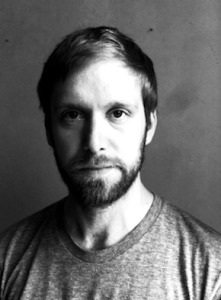She who is not her
by Heinz Helle
“A work of deadpan brilliance and unflinching honesty.” Alex Christofi, author of Glass
I have no idea what time it is. Someone is lying beside me. It’s not her. My head is not my head. She who is not her is actually quite pretty. I’m still drunk. She who is not her is still here. I pull away the covers. She who is not her is still quite pretty. A furrow on her brow, a deep, uncompromising sleep that is forcing the alcohol out of her bloodstream and the last traces of laughter out of her face. I look at her breasts. My hand reaches between her legs and I don’t find it strange or disgusting or arousing, I don’t find it anything. But that wall back there, I’ve seen that before, I know the guy who lives here, and I didn’t think he was the type of guy who did this type of thing. She who is not her is badly shaved, and I’ve still got a hard-on. She who is not her is scratchier than my chin. She who is not her does not wake up and as I slip on the condom I am reminded of a picture I saw at a restaurant once of Indians with buffalo heads sneaking up on a grazing herd. She who is not her still does not wake up. He who really doesn’t do this sort of thing carries on. Really, it’s already too light for this sort of thing. I close my eyes.
I see myself the night before, when it’s still dark. It’s about midnight, and at first my head is not my head. Let’s play a game, says a she who is also not her. We’ll each come up with a false identity and then we’ll each go talk to five strangers and afterwards we’ll tell each other what happened. It’s perfect for parties where you don’t know anyone, says she who is also not her.
After all, we don’t know each other. Which is why we’re having this stupid conversation about this strange game played by two idiots who don’t know anyone. Who both end up standing around on their own and eventually find one another. Like in PE at school when you’re the last to be picked. For the moment I am still telling myself that I could strike up a conversation with anyone at this party any time if I wanted to. But I don’t want to. Why did she who is also not her decide to speak to me anyway? She’s got short hair. She’s actually got quite a pretty face.
Or soap bubbles?
What?
It would be fun to blow soap bubbles, says she who is also not her, shooting a glance at the packet of cigarettes I have just taken out of my pocket.
I don’t smoke, you see, says she who is also not her. Which is a shame. If you smoke you can go outside and be outside and talk outside, but if you don’t smoke you just stand around outside without anything to do, which is why it would be fun to blow soap bubbles, says she who is also not her.
Does she who is also not her take my silence as a sign of agreement or of indifference? Would agreement be off-putting or encouraging, or would she try even harder the more indifferent I was?”
I put the cigarettes back in my pocket and take a sip of gin. Does she who is also not her take my silence as a sign of agreement or of indifference? Would agreement be off-putting or encouraging, or would she who is also not her try even harder the more indifferent I was? She really does have quite a pretty face, but that short hair.
What are you doing in New York?
I’m a visiting scholar at the City University.
What department?
Philosophy.
Really? You teach philosophy?
No, I’m working on a paper, I say, and I don’t think my tone of voice has changed and yet she who is also not her takes a step closer to me and says, with a serious look on her face: I won’t ask you what it’s about.
Thanks, I say, and for the first time in our conversation I laugh.
Very kind of you, I say, and she who is also not her begins to laugh as well, and this would be the beginning of something that could have come to a relaxed, conciliatory end for two egos and at the least my libido in my bed or in hers, if only she who is also not her didn’t have such short hair.
I see myself when it’s a little darker still, probably around three, and I see myself walking into an apartment in the financial district with someone else who is likewise not her and who has a spectacular cleavage and long blonde hair and suddenly begins to cry uncontrollably because apparently she who is likewise not her has acne – I can’t see that clearly by this point – and while she who is likewise not her is in the bathroom blowing her nose and drying her eyes, I realise that I am only here to see past her acne and to prove to her that it is possible for someone to find her beautiful and to prove to myself that someone wants to be found beautiful by me. Otherwise there is no reason for my presence here. And so I take off the T-shirt with the amusing cartoon figure on it that she who is likewise not her has given me to sleep in and leave the apartment. In the hallway I look briefly out of the window. I’ve never been so high up in New York before. The doorman does not seem surprised when I go past him for the second time in the space of twenty minutes.
I see myself when it’s so dark that I can’t quite see who is sitting next to me in the taxi taking us back to Brooklyn, but I assume it’s the person lying next to me right now, she who is not her. The taxi driver taking us to Brooklyn asks me if I’m from Germany and talks to me at first about the Autobahn, then about Porsche, then about the Jews, and I’m relieved when we get out. I freely accept his business card. Call me and I’ll send you a picture of my Mustang, he says, because he’s got a Mustang, wouldn’t that be something, him and his Mustang on the German Autobahn.
Through my closed eyelids I sense light. In my stomach something falls over. Hurriedly I get up and stumble into the bathroom. As my knees hit the tiles on either side of the toilet bowl I hear the front door close. I have no idea where she who is not her came from. But I know she isn’t her. Before the gag reflex sets in, the saliva pools in my mouth.
Extracted from Superabundance, translated by Kári Driscoll.
 Heinz Helle was born in 1978. He studied philosophy in Munich and New York. He has worked as copywriter for advertising agencies, and is a graduate of the Swiss Literature Institute in Biel. Superabundance, his first novel, is out now from Serpent’s Tail. His second, Eigentlich müssten wir tanzen (Actually, We Need to Dance) was longlisted for the 2015 German Book Prize. Read more.
Heinz Helle was born in 1978. He studied philosophy in Munich and New York. He has worked as copywriter for advertising agencies, and is a graduate of the Swiss Literature Institute in Biel. Superabundance, his first novel, is out now from Serpent’s Tail. His second, Eigentlich müssten wir tanzen (Actually, We Need to Dance) was longlisted for the 2015 German Book Prize. Read more.
Kári Driscoll was born in Iceland in 1980 and grew up in Iceland, Germany, England and Denmark. After studying German and Italian at Wadham College, Oxford, he completed his PhD in German at Columbia University, New York. He is a lecturer in Comparative Literature at Utrecht University, and previously translated Martin Mosebach’s What Was Before (Seagull Books, 2014).

